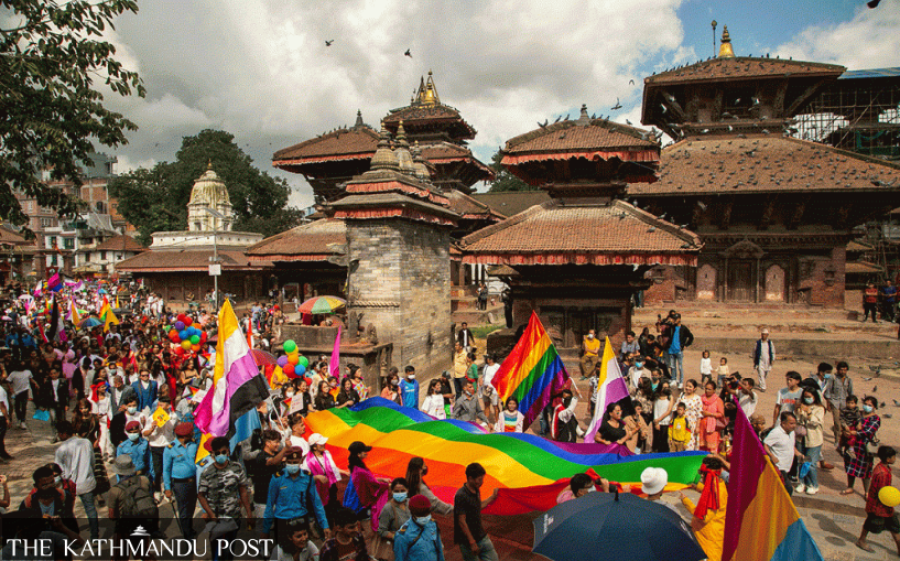Money
Nepal to host conference to help LGBTIQ+ visitors travel with pride
Research estimates that the global annual spending power of the queer consumer segment is $4.7 trillion.
Sangam Prasain
In July, Nepal produced the first batch of guides trained to guide lesbian, gay, bisexual, transgender, and intersex or queer (LGBTIQ+) trekkers.
Come January, Nepal will host the first international LGBTIQ+ tourism conference aimed at building more just and equitable societies and benefiting the economy.
LGBTIQ+ rights activists say they want Nepal to cash in on the multi-billion dollar LGBTIQ+ or pink tourism, just like Spain and Thailand are doing.
The conference announcement comes in the wake of the November 29 landmark verdict that allowed same-sex marriage in Nepal, the first in South Asia.
“Nepal is considered a champion and beacon of hope for LGBTIQ+ rights in South Asia. Now, it needs to tap its potential business opportunities—pink tourism,” said Sunil Babu Pant, the first openly gay former parliamentarian in Asia, briefing that the two-day conference will begin on January 18 in Kathmandu.
“We may invite prominent people from the LGBTIQ+ communities from around the world. The international participants may number just over 100. This is the beginning.”
Progressive laws and largely liberal attitudes of many countries have made them havens for LGBTIQ+ travellers. “Now, it’s time for Nepal to cash in on the opportunity.”
Lack of opportunities at home pushed nearly a million Nepalis to try their luck abroad in the last fiscal year.
Nepal’s economic growth has slowed. Construction, mining, and quarrying sectors are in the doldrums. Crash in the stock market, real estate, and low business confidence have rattled the economy.
When young people leave the country, its repercussions start to be visible in consumption. People hardly show up in major markets to buy mobile phones, cars, furniture, gold, and clothes.
The once-booming restaurants too are struggling to get young customers.
But tourism has shown a sign of revival.
“When the economy suffers, it’s hard for LGBTIQ+ communities to get jobs here. These are the people who struggle to get jobs abroad—mainly in the Gulf Cooperation Council countries and Malaysia where laws are harsh for them,” said Pant.
“Let’s tap into the global LGBTIQ+ community. They want to see the world,” he said. “They don’t have children to spend on. They are a loyal community that loves to travel and spends a lot every time.”
The LGBTIQ+ tourism events create a safe and welcoming space for individuals of diverse sexual orientations and gender identities. They promote inclusivity and foster a sense of belonging.
LGBTIQ+ events often showcase LGBTIQ+ artists, musicians, authors, and creators. They celebrate LGBTIQ+ culture, arts, and contributions to society.
These events can boost the local economy through tourism, increase business for local establishments, and create jobs.
“Once LGBTIQ+ tourism gets off the ground, it will encourage the expansion of hotels and restaurants by their community. They will open travel and tour agencies themselves,” said Nilhari Bastola, president of the Trekking Agencies Association of Nepal.
Now, Nepal is finally showing interest in investing in LGBTIQ+ tourism to cash in on the multi-billion-dollar pink economy, he said.
Research by corporate advisory and asset management company, LGBT Capital, estimates that the global annual spending power of the LGBTIQ+ consumer segment, measured in 2022, is $4.7 trillion.
There’s even a name for it—“pink money.”
According to the research, China is fast developing, with an estimated LGBT GDP now exceeding $872 billion. The 15+ LGBTIQ+ population is estimated at 388 million globally, with just over 75 million in China. The research says that LGBTIQ+ household wealth is estimated at $30 trillion globally, with almost $9.5 trillion in the US alone.
“We believe that hosting a successful LGBTIQ+ conference can put a destination on the map as an LGBTIQ+-friendly place to visit. This can lead to an increase in general tourism,” said Bastola.
Nepal’s two neighbours—India and China—are huge markets.
Members of the LGBTIQ+ community in China and India face social, cultural, and political discrimination, which may be why they remain a hidden sub-population.
“Nepal may be the perfect destination for them,” said Pant.
The conference is supported by the World Bank, Nepal Tourism Board, International Gay and Lesbian Travel Association, European LGBTQ+ Travel Alliance, and Nepal’s Trekking Agencies Association of Nepal.
“Hosting an event focused on LGBTIQ+ tourism promotes inclusivity and diversity,” said Nandini Lahe-Thapa, director at Nepal Tourism Board, the country’s tourism promotional body. “The LGBTIQ+ Tourism event creates a safe and welcoming space for individuals of diverse sexual orientations and gender identities. They promote inclusivity and foster a sense of belonging.”
“We will also look to have a better LGBTIQ+ marketing strategy.”
On 29 November, Surendra Pandey and Maya Gurung became the first same-sex couple in Nepal to have their marriage officially recognised, following a years-long legal wrangling.
Their legally recognised same-sex marriage is the first of its kind in a South Asian country and marks a milestone for LGBTIQ+ rights.
“Yes, obviously, we have been recognised by the government as citizens with equal rights. Now, we hope there is equality in employment,” said Pandey.
Pandey said that LGBTIQ+ workers face discrimination in the labour market.
“We have to struggle for access to employment, promotion and social security because of our different sexual orientation,” he said.
“The LGBTIQ+ tourism is seen as a lucrative market with potential economic contributions for us,” said Pandey. “For example, if there is a gay street, it contributes to the development of niche products and attracts tourists to our community there. This increases the scope for investment.”
“That’s why, the conference will be important for us to kick-start the LGBTIQ+ tourism business.”




 9.4°C Kathmandu
9.4°C Kathmandu













